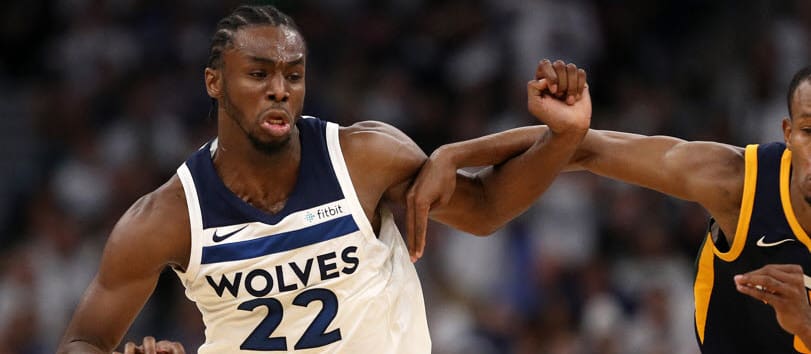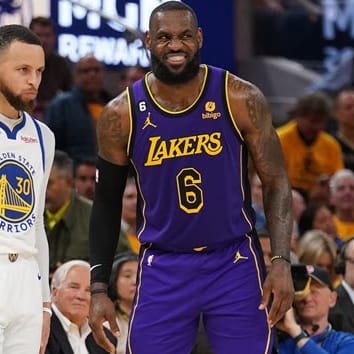This article is part of our In-Season Strategy series.
Entering Tuesday night, every NBA team has played between 17 and 22 games, placing us near the quarter-mark of the season. For GMs and decision-makers, this is the time of year to run an internal audit, of sorts, assessing what's gone right, what's gone wrong, and determining the direction of the team for the next five months.
While the stakes may be considerably lower, fantasy owners should be conducting their own quarter-season evaluations. Part of that process is determining which players you may have overpaid for in drafts and auctions and forming a plan to attempt to recoup that value. That flyer you took on Markelle Fultz looks like it's not going to pan out, while other, justifiable top-100 players, like Kevin Love, Kris Dunn and Will Barton, have been hampered by injuries.
Regardless of circumstance, there's a good chance that as you comb through your roster, things haven't gone precisely how you thought they would two months ago. With that in mind, let's highlight players who have underperformed relative to expectations as we hit the quarter mark:
Gordon Hayward, Celtics
I'm not ready to write off Hayward after 19 games, but the way he's moving on the floor and being used in the Celtics' deep rotation has been disappointing, to say the least. Hayward looked to maybe turn a corner last week with back-to-back solid games in wins over New York and Atlanta, but he was quiet and noticeably passive again in 23 minutes Monday against New Orleans.
Entering Tuesday, Hayward is shooting just 40 percent from the floor and 29 percent from three, while his free throw rate (23.5%) is by far the lowest of his career. Even if Hayward begins to look more comfortable, physically, it's difficult to envision a path to the workload necessary for his scoring to return to pre-Boston levels. The Celtics already have too many mouths to feed -- and that's with Hayward's usage rate sitting nearly 10 percentage points lower (18.3%) than his final season in Utah (27.6%)
If there's a silver lining, it's that his assists (3.2 APG), rebounds (5.4 RPG) and steals (1.3 SPG) contributions have been better than expected, though they haven't made up for the dramatic dip in scoring and efficiency.
Kevin Love, Cavaliers
Love only lasted four games before going down with a toe injury, and while he struggled to shoot well on increased volume (32.3% FG; 29.2% 3PT), he played with the renewed aggression most expected in the wake of LeBron James' departure. While the sample size is admittedly small, Love averaged more than 16 field goal attempts and eight free throw attempts per game -- easily his highest figures since leaving Minnesota. That helped boost his usage rate to 28.4 percent, up more than three percentage points over last season.
Love also pulled down 13.5 rebounds and added 3.5 assists per game -- both his best since 2013-14. The Cavs hope to have Love back around the turn of the calendar, and his contributions as a scorer and rebounder will be welcomed back by fantasy owners, though he'll need to improve his efficiency to warrant a Yahoo ADP of 32.4. His field goal percentage should rise closer to 40 percent, but it's probably not realistic to expect a leap into the mid or high-40s.
Will Barton, Nuggets
Like Love, Barton is on this list entirely due to injury. Barton's season took a turn for the worse less than two games in, when he suffered a groin injury that's expected to keep him on the shelf into at least mid-December. The sample is too small to glean anything meaningful, but Barton played 35 minutes in the Nuggets' opener and finished with 19 points, five rebounds, two assists and two blocks.
Given the uncertain timetable, Barton has been a tough player to hold onto in leagues without an IR slot, but as his return approaches, he's worth a cursory check of the waiver wire, as he's available in 17 percent of Yahoo leagues as of Tuesday.
Draymond Green, Warriors
Injury has also played a part in Green's disappointing start, but even before the toe issue that currently has him sidelined, the 28-year-old showed signs of further regression as a scorer. Through 13 games, Green is averaging just 6.9 points per game on 44.4 percent shooting, including a ghastly 22.2 percent from deep. To Green's credit, he's cut back on bombing away from deep -- 2.1 3PA/G, down from 3.7 last season -- but at this point the player who provided more than a make per game at close to 40 percent a few years ago is gone. Green is still a rare assists contributor for his position who adds elite steals and solid rebounding numbers, but his shot-blocking also tailed off (0.8 BPG) prior to the injury, as did his free throw shooting (66.7% FT). Green could certainly bounce back once the toe is no longer an issue, but thus far he's been a failed investment for owners who took him, on average, almost a full round ahead of Blake Griffin.
Donovan Mitchell, Jazz
A second-year guard averaging 20.6 points per game usually isn't a disappointment, but Mitchell still bears mentioning given his top-20 ADP. There's still plenty of time to turn things around, but Mitchell, who's currently injured, is yet to demonstrate any improvement over his breakout rookie year. He's actually regressed in nearly every category, most notably from beyond the arc, where he's converting fewer than 30 percent of his 6.6 attempts per game. Mitchell has also lost just over a rebound per game, while his assists (3.7 APG) have remained steady.
Mitchell is still a no-brainer starter in most weeks, but he hasn't taken the leap toward being closer to a 25-5-5 player that most owners expected.
Markelle Fultz, 76ers
Not much to say here. As the Sixers and the rest of the basketball world anxiously await the results of meetings with specialists this week, Fultz's value -- as a player, a fantasy commodity, and a trade asset -- is close to rock-bottom. Most owners were cautiously optimistic during draft season, but Fultz was selected in 99 percent of Yahoo leagues and had an ADP just outside the top 120 -- two spots below De'Aaron Fox. In that range, he wasn't going to be a roster cornerstone, but in retrospect Fultz is a wasted pick that could've been used on Dennis Schroder, Domantas Sabonis, Caris LeVert, or Montrezl Harrell.
Jonathan Isaac, Magic
Ankle injuries limited Isaac to just 27 games as a rookie, many of which he played with a minutes restriction. A year later, he's averaging only two more minutes per game (21.9 MPG), and while his scoring and rebounding have increased accordingly, he hasn't generated the same defensive value that was, in large part, the reason why so many were high on him coming into the season. Isaac's block rate is slightly down, while his steal rate has been sliced in half, down to 1.5 percent. It's far too early in Isaac's career to draw any conclusions -- and he did miss time earlier this month with another ankle issue -- but with averages of 8.2 points and 5.2 rebounds, with less than one assist and one made three per game (30.3% 3PT), Isaac hasn't had the breakout season some anticipated.
Other Notables
Lonzo Ball, Lakers: Much like last season, Ball has had his ups and downs. He's improved his overall shooting efficiency, but he's playing fewer minutes, and his counting stats are down across the board. Ball is still struggling at the charity stripe (57% FT), but the good (I guess?) thing for fantasy owners is he has an absurdly low free throw rate. For context: Quincy Pondexter has more free throw attempts (15) in 90 minutes than Ball (14) has in 514.
Dennis Smith, Mavericks: Smith has been fine, and the jumps in field goal (44.3% FG) and three-point (39.3% 3PT) efficiency are an encouraging development, but the arrival of Luka Doncic has hampered his scoring and assists. He's averaging just 3.9 assists per game through 16 contests, while his turnovers (3.1 TPG) are up.
Kris Dunn, Bulls: Another player hampered by injury, Dunn played just one game before going down with a sprained MCL. He should be back sometime next month, but he'll have trouble recouping borderline-top-80 value in what'll suddenly be a crowded Chicago offense.
Andrew Wiggins, Timberwolves: Wiggins' inclusion probably depends on how you viewed him coming into the year. Either way, he hasn't justified a top-85 ADP. After going 4-of-23 from the floor over his last two games, Wiggins' field goal percentage is down to 37.8 percent, and he's averaging a career-low 15.2 points per game. His rebounding has also dipped, and he continues to show very little feel as a passer.












